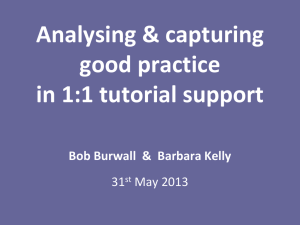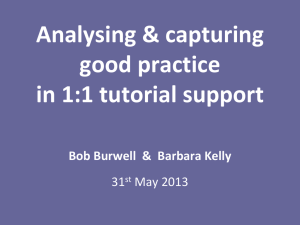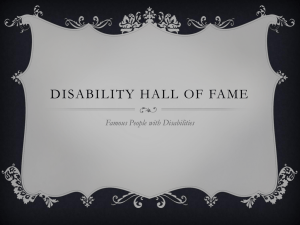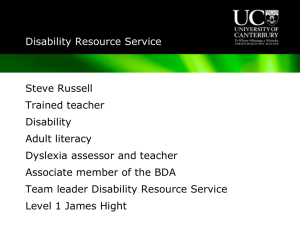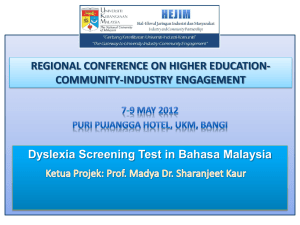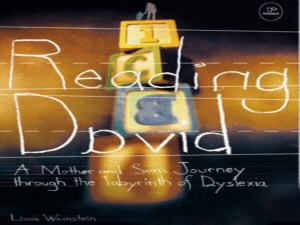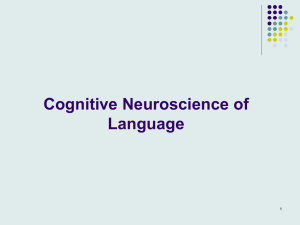MedicalandSocialModelofDyslexiaPresentation
advertisement
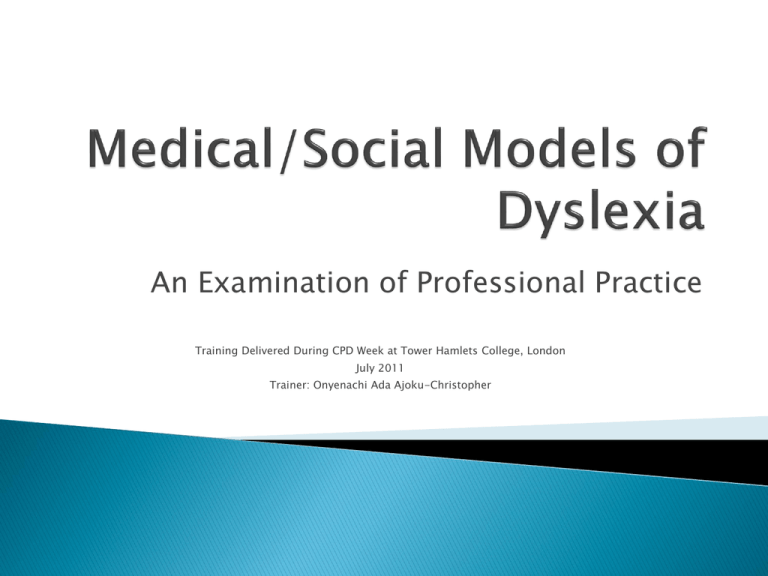
An Examination of Professional Practice Training Delivered During CPD Week at Tower Hamlets College, London July 2011 Trainer: Onyenachi Ada Ajoku-Christopher As professionals in the area of learning support, to what extent does our knowledge of the social and medical models of disability/dyslexia directly or indirectly, consciously or unconsciously influence the way we deliver support to our dyslexic learners? Dyslexia: a label Dyslexia : a condition Dyslexia: an experience Dyslexia: a disability Dyslexia: a difference Dyslexia: a problem People suffering from dyslexia People who have dyslexia People who experience dyslexia People who are dyslexic Dyslexic person ‘Is there a cure?’ ‘I don’t want to be dyslexic’ ‘So, I am stupid then’ ‘My friends will make fun of me’ ‘I don’t want to continue with the assessment because I don’t want to be dyslexic’ ‘I am not normal’ ‘I know something is wrong with my brain’ ‘Something is wrong with me’ http://www.youtube.com/watch?v=BaPWfueD LeY&feature=player_detailpage What strategies do you as professionals suggest we employ to change negative perceptions of dyslexia among our students? To what extent should emotional support/supportive counselling and empowerment (outside the parameters of coursework) be part of the service we offer our dyslexic learners? Influences Culture bound ideas Individual perceptions Societal perceptions School culture Every disability/difference is unique hence the reason for diverse definitions which reflect the understanding of each type of disability, which invariably impact on learning support provision. Disability definitions and societal perceptions of disability could create a great impact on the way learning support provision is addressed in educational settings. Perceptions of disability and the definitions assigned them have strong implications for funding for learning support. It could be argued that disability policy is a reflection of how policy makers and individuals in society understand disability. Disability rights activists play a great role in the cyclical modification of conceptions and definitions of disability. This has great significance in the way learning support provision is addressed. Dyslexia is evident when accurate and fluent reading and/or spelling develops very incompletely or with great difficulty. This focuses on literacy learning at the word level and implies that the problem is severe and persistent despite appropriate learning opportunities. (British Psychological Society, 1999) “Dyslexia is a specific learning difficulty which mainly affects the development of literacy and language related skills. It is likely to be present at birth and to be lifelong in its effects. It is characterised by difficulties with phonological processing, rapid naming, working memory, processing speed, and the automatic development of skills that may not match up to an individual’s other cognitive abilities. It tends to be resistant to conventional teaching methods, but its effects can be mitigated by appropriately specific intervention, including the application of information technology and supportive counselling.” (British Dyslexia Association) “We would argue that dyslexia is an experience that arises out of natural human diversity on the one hand and a world on the other where the early learning of literacy, and good personal organisation and working memory is mistakenly used as a marker of ‘intelligence’. The problem here is seeing difference incorrectly as ‘deficit’.” (Cooper, 2006) The social model advocates difference and neurodiversity. http://www.youtube.com/watch?v=09XvIBLK 8OQ Do you have a longer straw? Source: http://www.cartoonstock.com/directory/l/long_neck.asp Dyslexia is a neurological problem of genetic origin which makes the acquisition of language skills extremely difficult. The term is Greek in origin and literally means "difficulty with language". The condition is sometimes referred to as word blindness, word deafness, specific language based disability, developmental dyslexia and mirror reading. (The GOW School for Dyslexia and Learning Disabilities) The medical model holds that the problem is located within the individual. Source: http://www.ddsg.org.uk/taxi/images/medical-model.gif Both the medical and social models of disability and dyslexia have made profound contributions to disability debates. Many past and present support practices, have been and still are built on the understanding of these models. What is your personal/professional take on each of the models? Which would you advocate for? To what extent could it be argued that our view of dyslexia i.e. disability or difference, has implications for the way support is offered to our learners? British Dyslexia Association (n.d). Available at: http://www.bdadyslexia.org.uk/aboutdyslexia/further-information/dyslexia-research-information-.html [Accessed July 2011] British Psychological Society (1999). British Psychological Society (1999: reprinted 2005) Dyslexia, Literacy and Psychological Assessment: Report by the Working Party of the Division of Educational and Child Psychology of the British psychological Society, BPS, Leicester Cooper, R. (2010). The Social Model of Dyslexia [Online video] 2010. Available at: http://www.youtube.com/watch?v=09XvIBLK8OQ [Accessed July 2011]. Cooper, R. (2010). On Being Dyslexic [Online video] 2010. Available at: http://www.youtube.com/watch?v=BaPWfueDLeY&feature=player_detailpage [Accessed July 2011]. Cooper, R. (2006). A Social Model of Dyslexia. London South Bank University. The GOW School for Dyslexia and Learning Disabilities (2009). FAQ’s About Dyslexia. Available at: http://www.gow.org/page.cfm?p=343 [Accessed July 2011].

